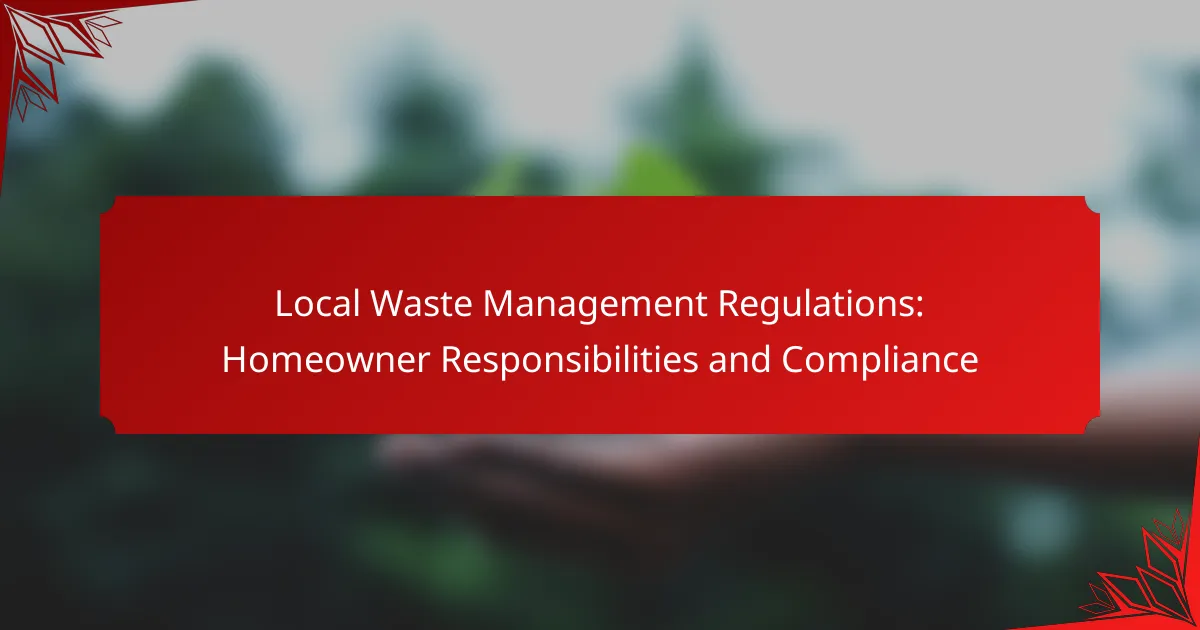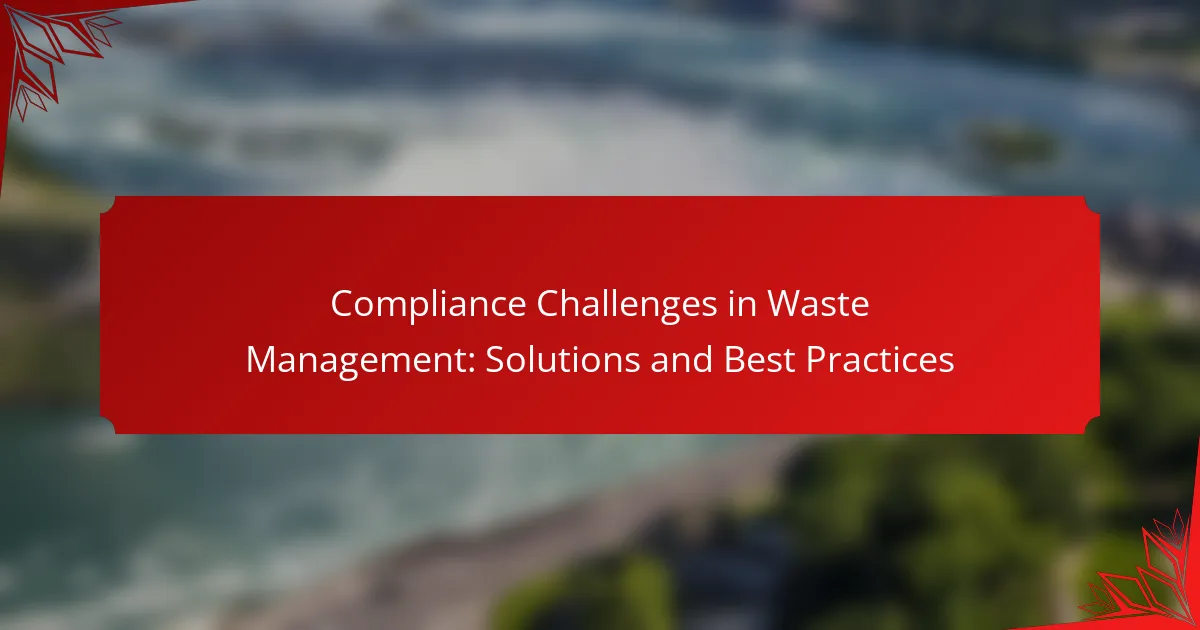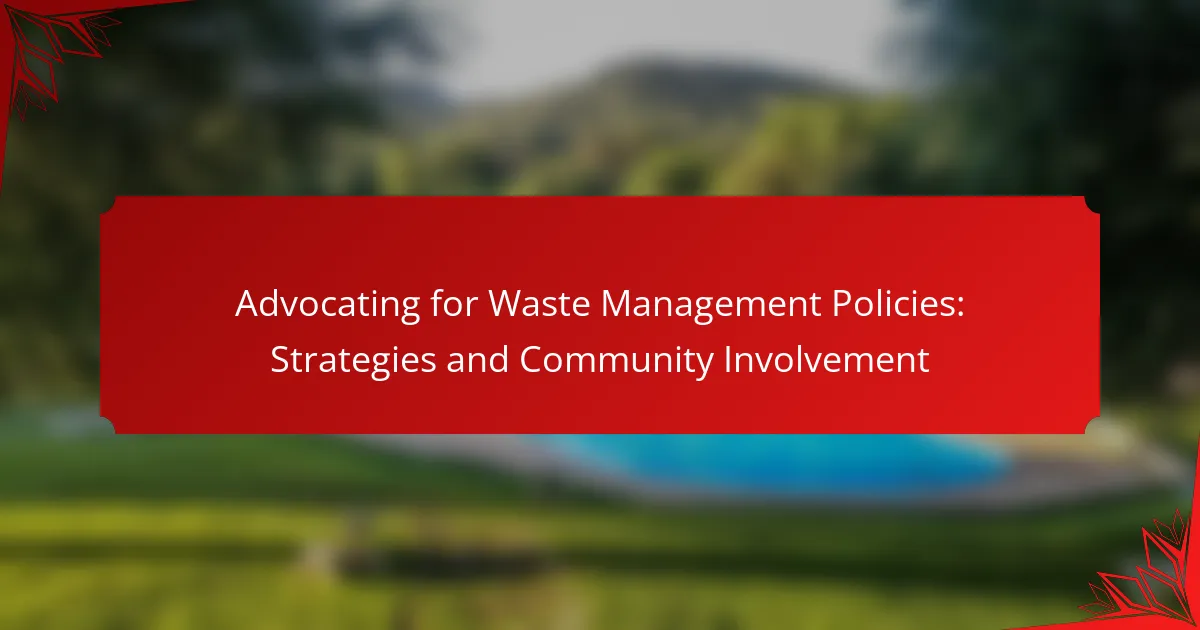In Los Angeles, homeowners are required to follow specific waste management regulations that focus on recycling, hazardous waste disposal, and composting. By complying with these guidelines, residents contribute to reducing landfill waste and fostering environmental sustainability while avoiding potential penalties for non-compliance.
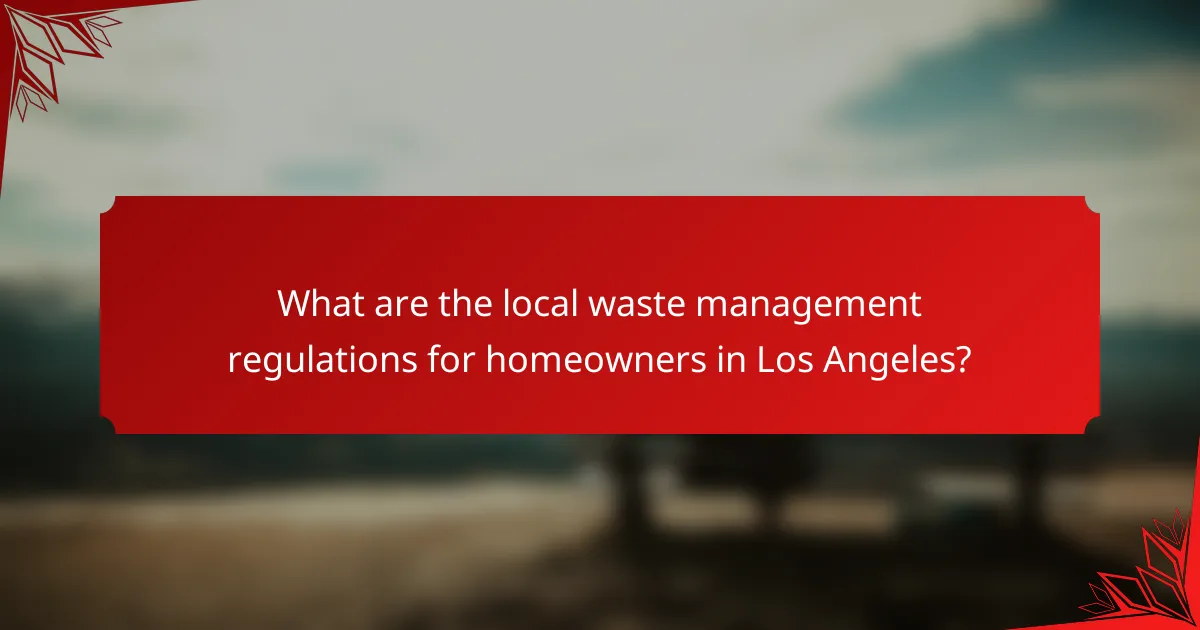
What are the local waste management regulations for homeowners in Los Angeles?
In Los Angeles, homeowners must adhere to specific waste management regulations that include recycling, hazardous waste disposal, and composting. Compliance with these regulations helps reduce landfill waste and promotes environmental sustainability.
Mandatory recycling programs
Los Angeles mandates that homeowners participate in recycling programs to divert waste from landfills. Residents are required to separate recyclable materials such as paper, cardboard, glass, and certain plastics from their regular trash.
Recycling bins are typically provided by waste management services, and homeowners should ensure they are used correctly. Failure to comply may result in fines or additional fees.
Hazardous waste disposal guidelines
Homeowners must follow strict guidelines for disposing of hazardous waste, which includes items like batteries, paints, and chemicals. These materials cannot be placed in regular trash and must be taken to designated hazardous waste collection sites.
The city often organizes special collection events where residents can safely dispose of hazardous materials. It is crucial to check local schedules and guidelines to avoid penalties and ensure safe disposal.
Composting requirements
Los Angeles encourages composting as part of its waste management strategy. Homeowners are advised to compost organic waste such as food scraps and yard debris to reduce landfill contributions.
While participation in composting is highly recommended, specific regulations may vary. Residents can use city-provided compost bins or create their own compost systems, ensuring they follow best practices to maintain a healthy compost environment.
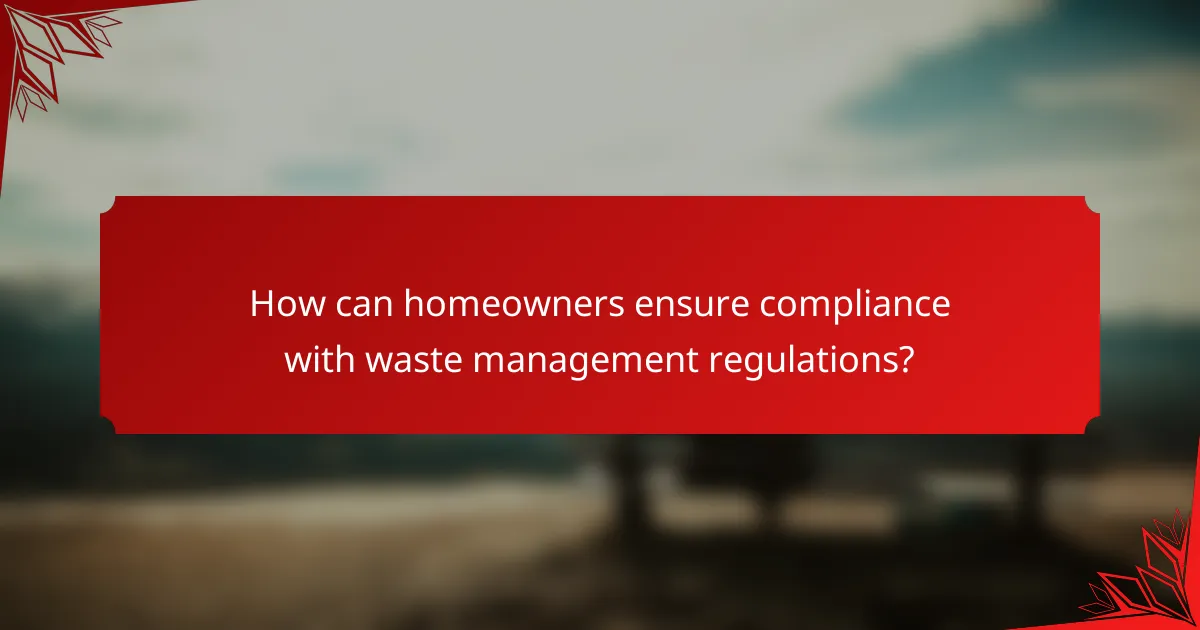
How can homeowners ensure compliance with waste management regulations?
Homeowners can ensure compliance with waste management regulations by actively engaging in waste audits, participating in community clean-up events, and utilizing local waste management resources. These steps help maintain proper waste disposal practices and align with local regulations.
Regular waste audits
Conducting regular waste audits allows homeowners to assess their waste generation and disposal habits. This involves examining what types of waste are produced, how much is generated, and identifying areas for improvement. Aim to perform these audits quarterly to stay informed and compliant.
During a waste audit, categorize waste into recyclables, compostables, and landfill items. This can help you understand your waste composition and make informed decisions about reducing waste. Consider using a simple checklist to track your findings and set goals for waste reduction.
Participating in community clean-up events
Joining community clean-up events is an effective way for homeowners to contribute to local waste management efforts. These events not only help beautify neighborhoods but also raise awareness about proper waste disposal practices. Look for events organized by local municipalities or environmental groups.
Participation in these events can also foster a sense of community and encourage others to adopt responsible waste management behaviors. Check local social media pages or community boards for upcoming clean-up dates and volunteer opportunities.
Utilizing local waste management resources
Homeowners should take advantage of local waste management resources to stay compliant with regulations. This includes understanding the schedule for curbside pickup, recycling guidelines, and drop-off locations for hazardous waste. Local government websites often provide detailed information on these services.
Additionally, many municipalities offer educational materials or workshops on waste reduction and recycling. Engaging with these resources can enhance your knowledge and ensure that you are following best practices in waste management.
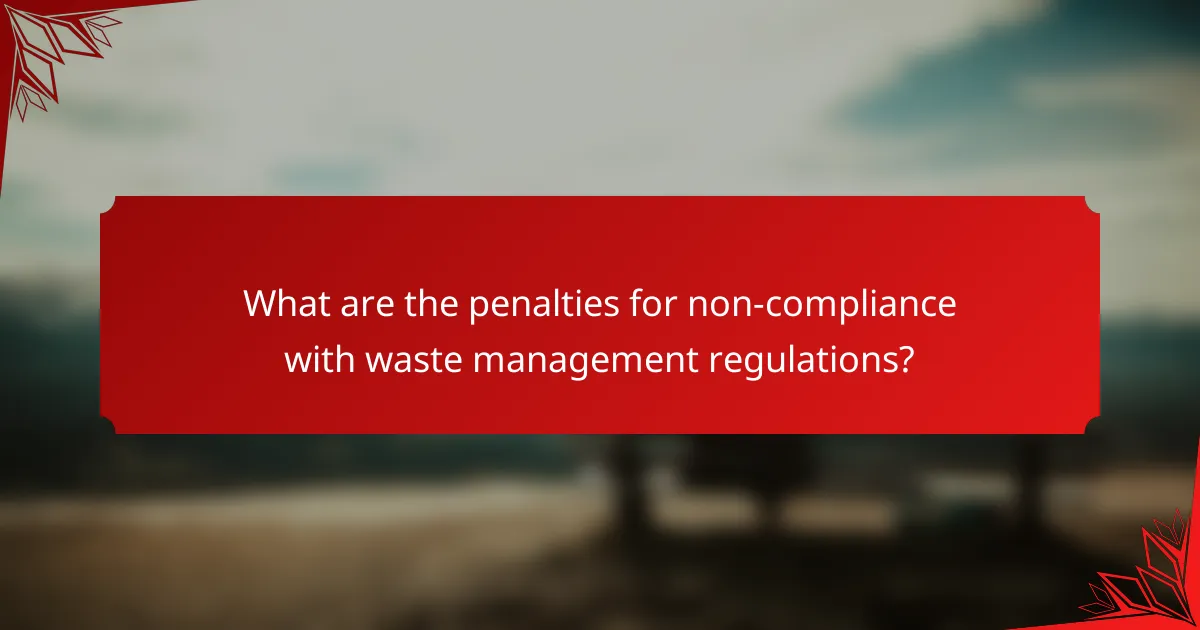
What are the penalties for non-compliance with waste management regulations?
Penalties for non-compliance with waste management regulations can include fines, community service, and legal actions. Homeowners must understand these consequences to ensure they adhere to local waste disposal laws.
Fines for improper disposal
Improper disposal of waste can lead to significant fines, which typically range from a few hundred to several thousand dollars, depending on the severity of the violation. Local municipalities often set these fines, and repeat offenders may face escalating penalties.
For example, disposing of hazardous materials in regular trash can incur higher fines than general littering. Homeowners should familiarize themselves with their local waste management guidelines to avoid these costs.
Community service requirements
In some jurisdictions, homeowners found guilty of waste management violations may be required to complete community service. This can involve participating in local clean-up efforts or educational programs about proper waste disposal.
Community service not only serves as a penalty but also aims to raise awareness about waste management practices. Engaging in these activities can help offenders understand the importance of compliance.
Legal actions for repeated violations
Repeated violations of waste management regulations can lead to more severe legal actions, including court appearances and potential criminal charges. Local authorities may pursue these actions to enforce compliance and deter future infractions.
Homeowners facing legal action should seek legal advice to navigate the complexities of waste management laws. Understanding the local regulations can help prevent escalation to this level.
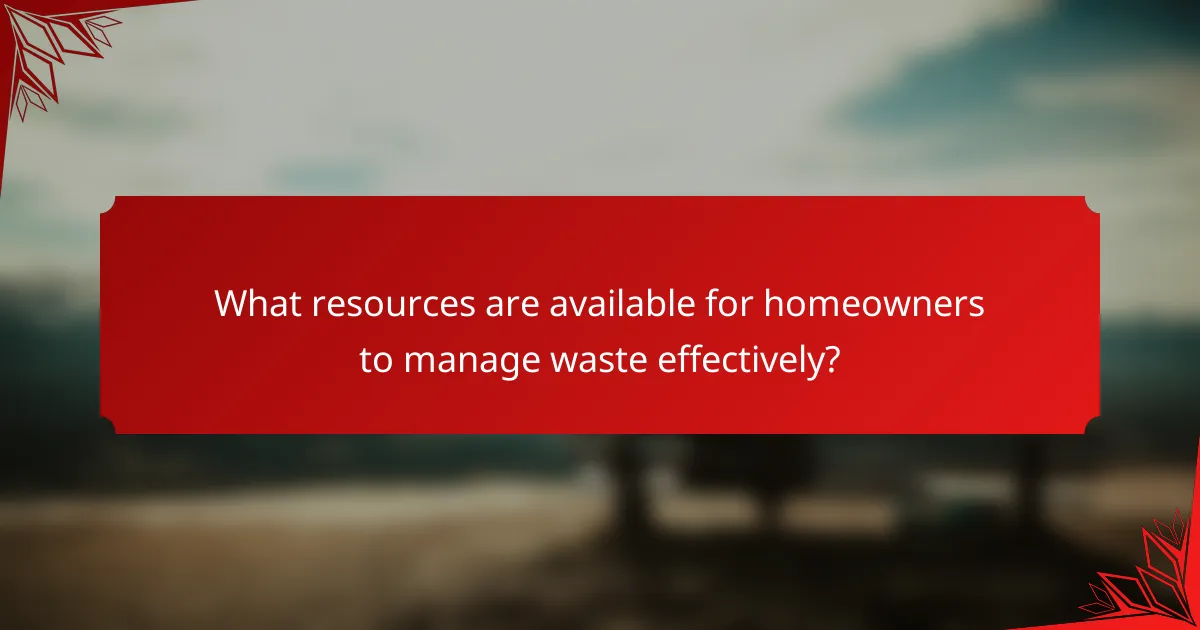
What resources are available for homeowners to manage waste effectively?
Homeowners can access a variety of resources to manage waste effectively, including local waste management websites, mobile apps, and community workshops. These tools provide essential information and support to ensure compliance with local regulations and promote sustainable practices.
Local waste management websites
Local waste management websites serve as a primary resource for homeowners seeking information on waste disposal guidelines, recycling programs, and collection schedules. These sites often provide details on what materials can be recycled, hazardous waste disposal options, and any upcoming changes to waste collection services.
Homeowners should regularly check their local waste management website for updates, as regulations and services can change frequently. Many municipalities also offer downloadable resources, such as waste sorting guides and calendars for collection days.
Mobile apps for waste tracking
Mobile apps for waste tracking help homeowners monitor their waste generation and recycling habits. These apps can provide reminders for collection days, tips for reducing waste, and information on local recycling facilities. Some popular apps even allow users to scan items to determine their recyclability.
Using a waste tracking app can encourage homeowners to adopt better waste management practices by providing personalized feedback and insights into their waste production. Look for apps that are compatible with local regulations to ensure accurate information.
Community workshops on waste reduction
Community workshops on waste reduction offer hands-on learning experiences for homeowners looking to minimize their waste footprint. These workshops often cover topics such as composting, DIY recycling projects, and sustainable living practices. Participating in these events can foster a sense of community and shared responsibility for waste management.
Homeowners should seek out workshops hosted by local governments or environmental organizations, as these sessions are typically free or low-cost. Engaging with neighbors and experts can provide valuable insights and practical strategies for effective waste management at home.
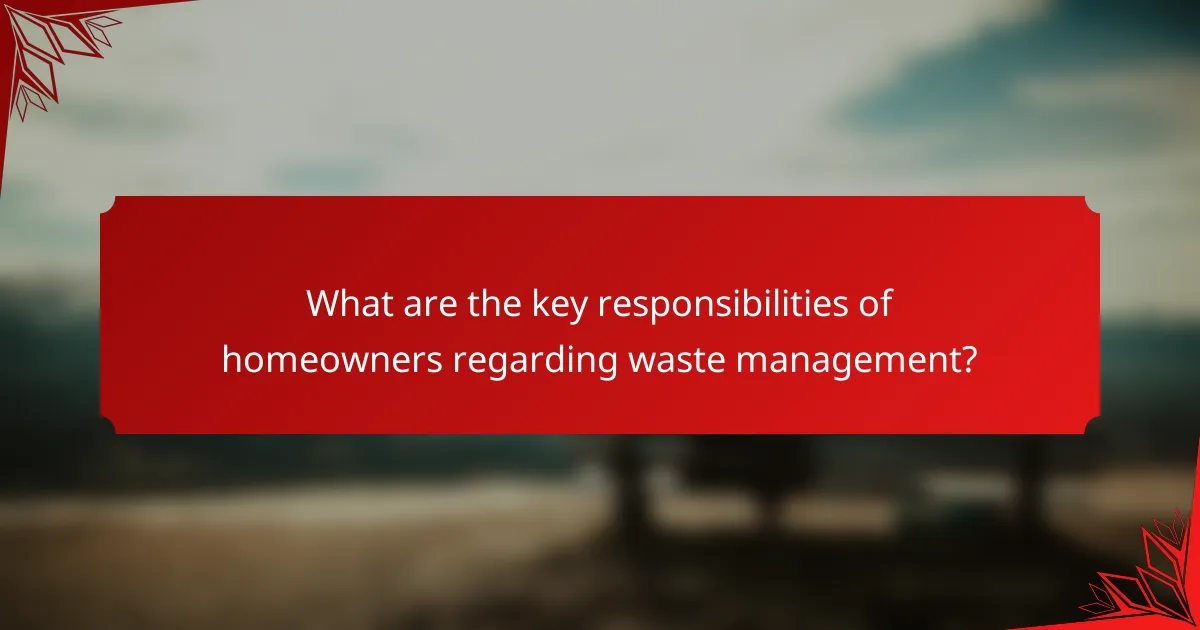
What are the key responsibilities of homeowners regarding waste management?
Homeowners play a crucial role in waste management by ensuring proper sorting, timely collection, and reporting of illegal dumping. These responsibilities help maintain community cleanliness and comply with local regulations.
Proper sorting of recyclables
Homeowners must sort recyclables from general waste to promote effective recycling. This typically includes separating materials like paper, plastics, metals, and glass, which can often be recycled. Check local guidelines for specific sorting rules, as they can vary significantly by municipality.
To make sorting easier, consider using clearly labeled bins for different materials. Avoid contaminating recyclables with food waste, as this can lead to rejection at recycling facilities.
Timely waste collection
Timely waste collection is essential for maintaining a clean environment. Homeowners should be aware of their local collection schedule and ensure that waste is placed out for pickup on the designated days. This often includes both general waste and recyclables.
To avoid missed collections, set reminders for collection days and ensure bins are accessible. If collection is delayed, contact your local waste management service for guidance on next steps.
Reporting illegal dumping
Homeowners should report illegal dumping to local authorities to help protect the environment and community health. This includes any unauthorized disposal of waste in public areas or private property. Reporting can often be done through local government websites or hotlines.
When reporting, provide specific details such as the location, type of waste, and any identifying information about the person or vehicle involved, if known. Prompt reporting can lead to quicker clean-up and enforcement actions against offenders.
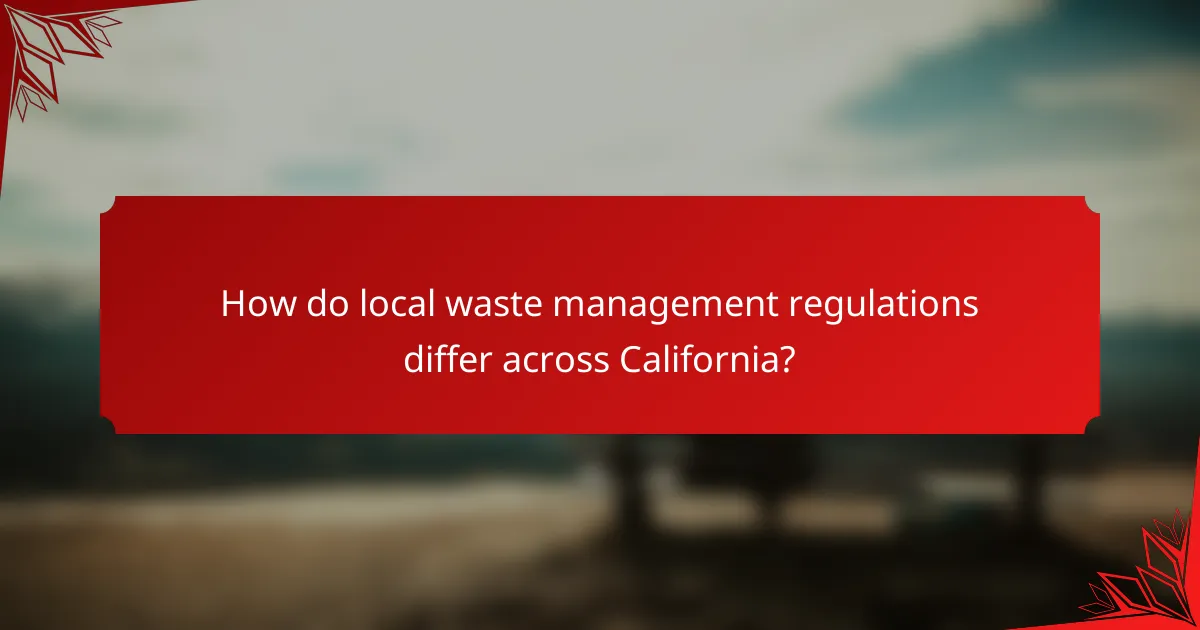
How do local waste management regulations differ across California?
Local waste management regulations in California vary significantly by city and county, reflecting diverse environmental priorities and community needs. Homeowners must understand these differences to ensure compliance and effective waste disposal.
City-specific regulations
Each city in California may have its own waste management regulations, which can include specific guidelines on recycling, composting, and landfill use. For example, San Francisco mandates composting for all residents, while Los Angeles has different recycling requirements. Homeowners should check their local municipal codes to understand the specific rules that apply to their area.
County-wide initiatives
Counties often implement broader waste management initiatives that affect all cities within their jurisdiction. These initiatives can include county-wide recycling programs or hazardous waste disposal events. For instance, Santa Clara County has a comprehensive waste reduction plan that encourages residents to minimize waste and participate in recycling programs.
Penalties for non-compliance
Failure to comply with local waste management regulations can result in fines or penalties, which vary by location. In some areas, homeowners may face fines for improper disposal of hazardous materials or for not participating in recycling programs. It is crucial for residents to stay informed about their local regulations to avoid these penalties.
Best practices for homeowners
To ensure compliance with local waste management regulations, homeowners should adopt best practices such as regularly reviewing local guidelines, participating in community clean-up events, and properly sorting waste. Additionally, utilizing local resources like waste management websites can provide valuable information on disposal options and recycling programs.
